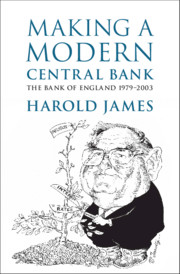Crossref Citations
This Book has been
cited by the following publications. This list is generated based on data provided by Crossref.
Bordo, Michael D.
and
Levy, Mickey D.
2021.
Do enlarged fiscal deficits cause inflation? The historical record.
Economic Affairs,
Vol. 41,
Issue. 1,
p.
59.
2021.
Monetary War and Peace.
p.
281.
Wigmore, Barrie A.
2021.
The Financial Crisis of 2008.
Coombs, Nathan
and
Thiemann, Matthias
2022.
Recentering central banks: Theorizing state-economy boundaries as central bank effects.
Economy and Society,
Vol. 51,
Issue. 4,
p.
535.
Rognes, Asa Malmstrom
and
Schenk, Catherine R.
2023.
One country, two currencies: The adoption of the Hong Kong currency board, 1983.
The Economic History Review,
Vol. 76,
Issue. 2,
p.
477.
Acosta, Juan
Cherrier, Beatrice
Claveau, François
Fontan, Clément
Goutsmedt, Aurélien
and
Sergi, Francesco
2023.
Six Decades of Economic Research at the Bank of England.
History of Political Economy,
Selva, Simone
2023.
The Palgrave Handbook of Global Social Problems.
p.
1.
Rieder, Kilian
Anson, Michael
Bholat, David
and
Thomas, Ryland
2023.
Dating the Lender of Last Resort.
The Economic Journal,
Vol. 133,
Issue. 652,
p.
1657.
James, Harold
2023.
Inflation and globalisation: The Tawney Lecture 2022.
The Economic History Review,
Vol. 76,
Issue. 2,
p.
391.
Goutsmedt, Aurélien
Sergi, Francesco
Cherrier, Béatrice
Acosta, Juan
Fontan, Clément
and
Claveau, François
2024.
To change or not to change. The evolution of forecasting models at the Bank of England.
Journal of Economic Methodology,
p.
1.
Nelson, Edward
2024.
The Challenge in 2000−2009 to Phillips-Curve-Based Accounts of UK Economic Policy: Comment on Cristiano.
History of Political Economy,
Vol. 56,
Issue. 4,
p.
713.
Pape, Fabian
and
Rommerskirchen, Charlotte
2024.
Co-working in the collateral factory: analyzing the infrastructural entanglements of public debt management, central banking, and primary dealer systems.
Review of International Political Economy,
Vol. 31,
Issue. 5,
p.
1371.



